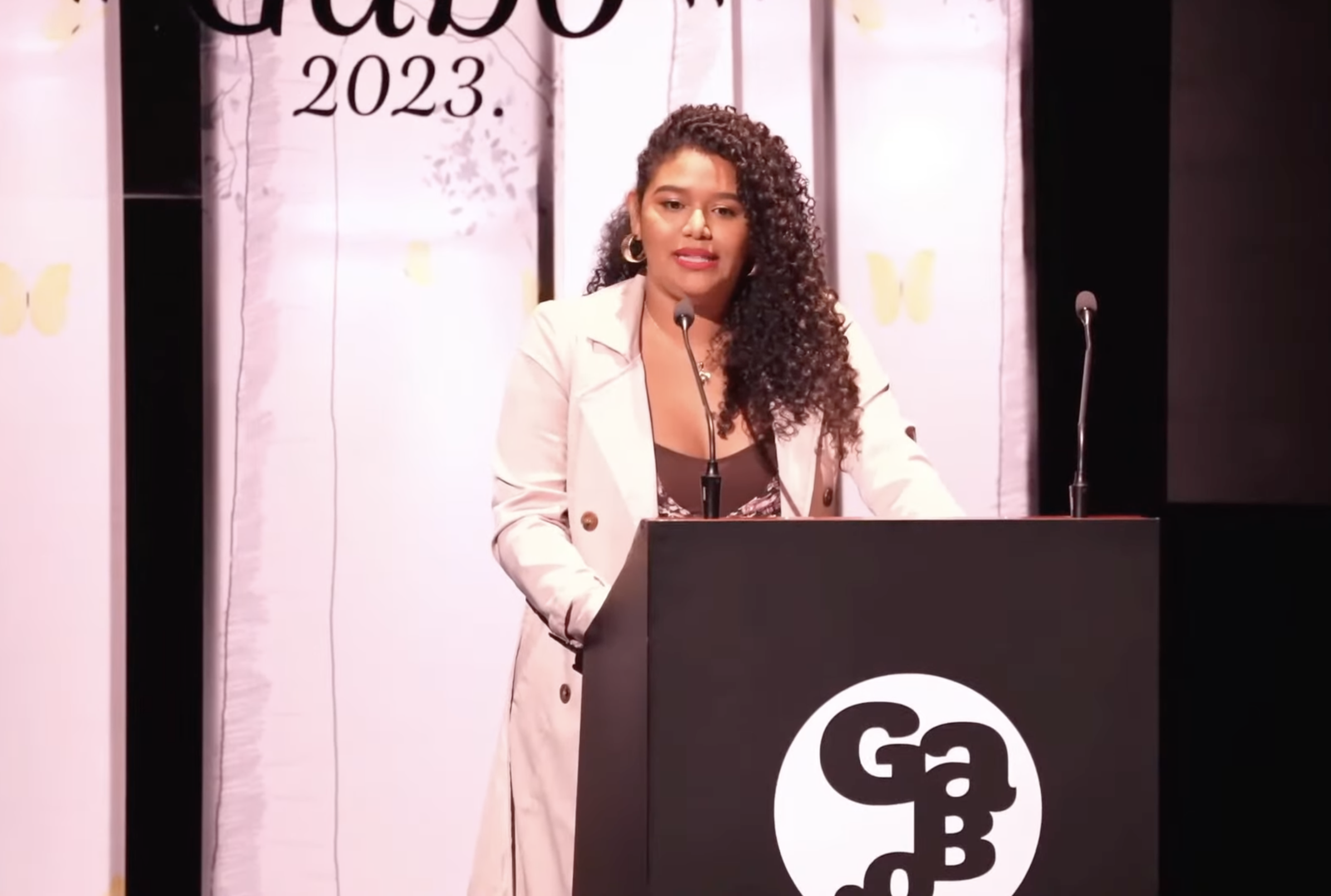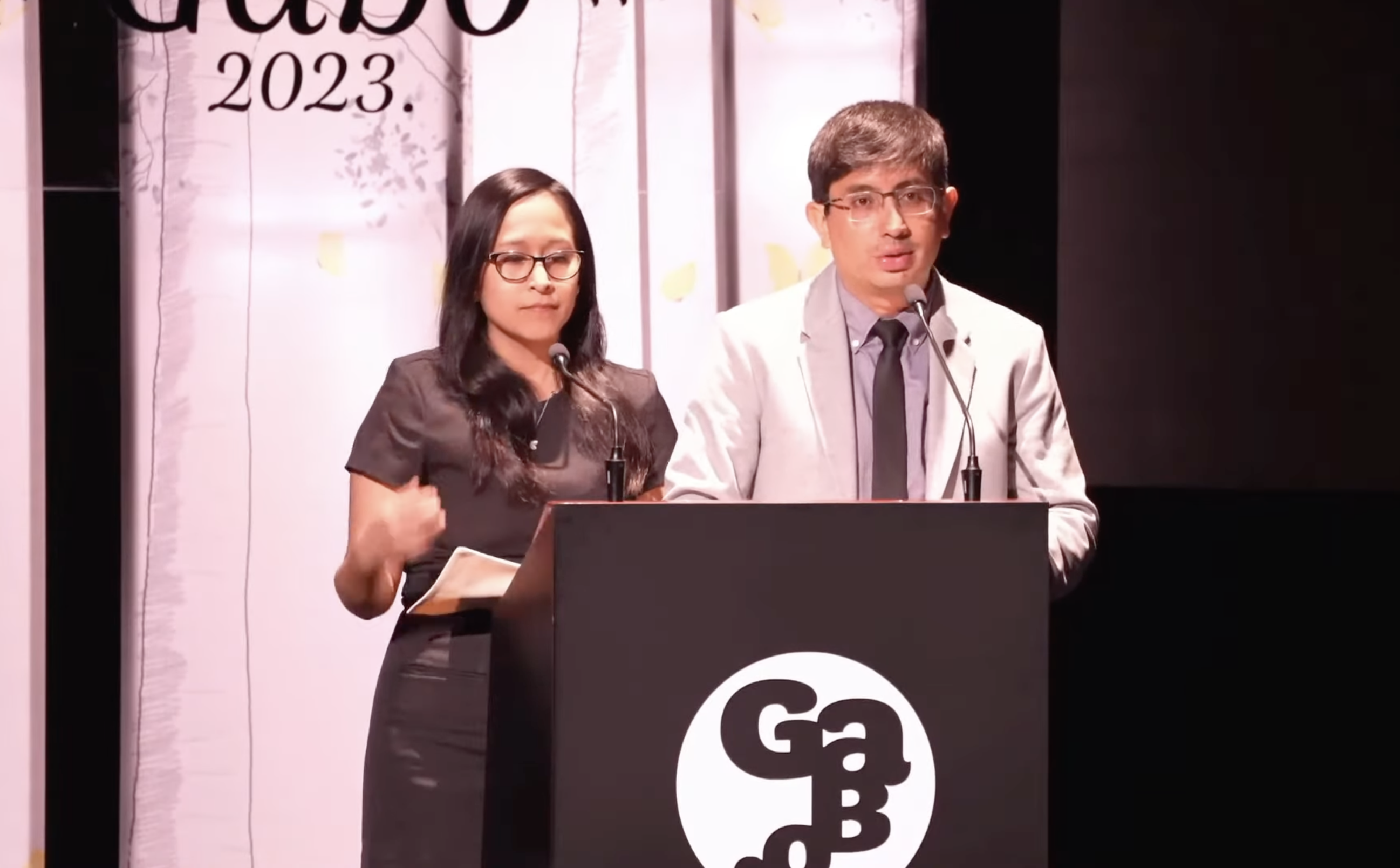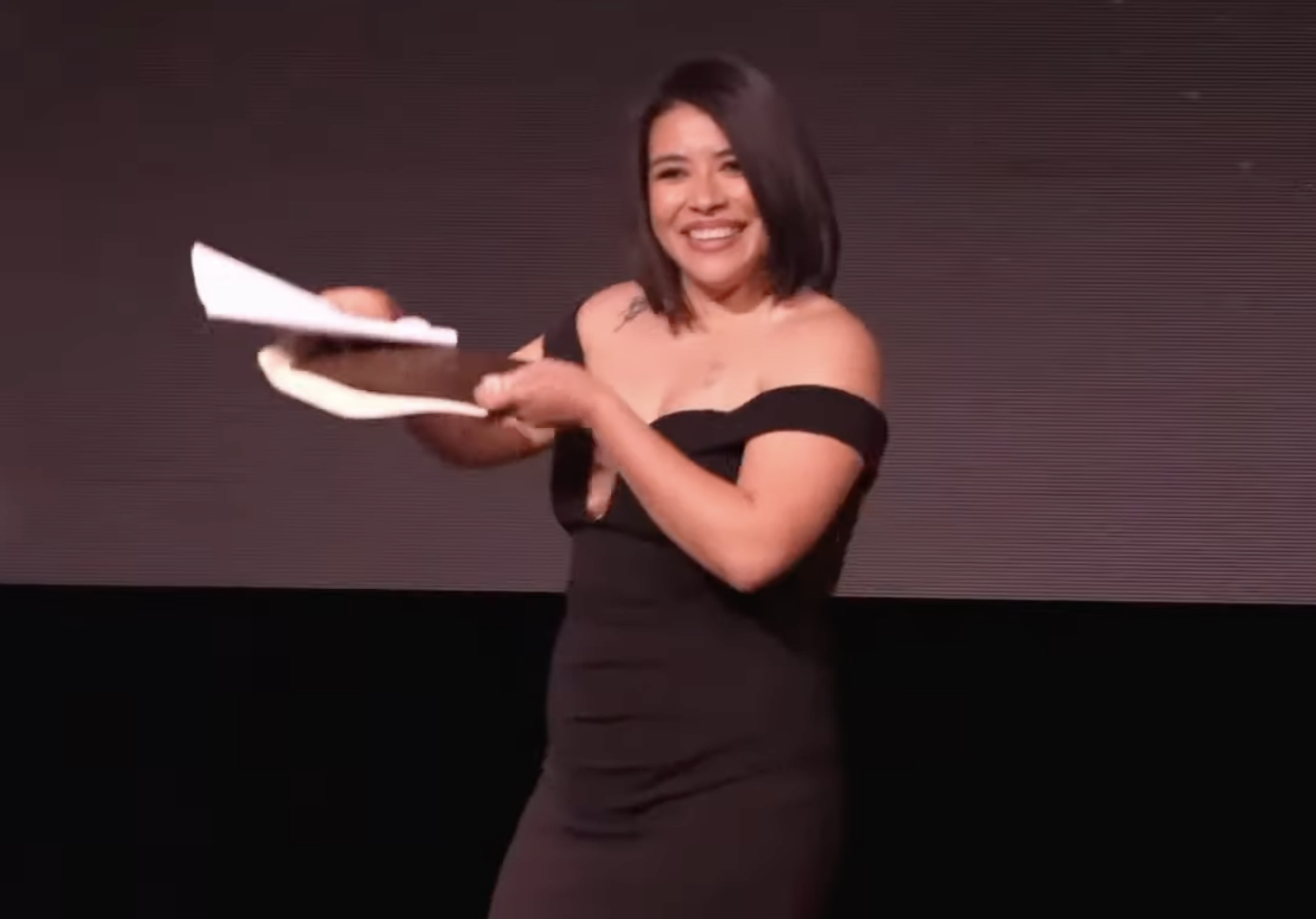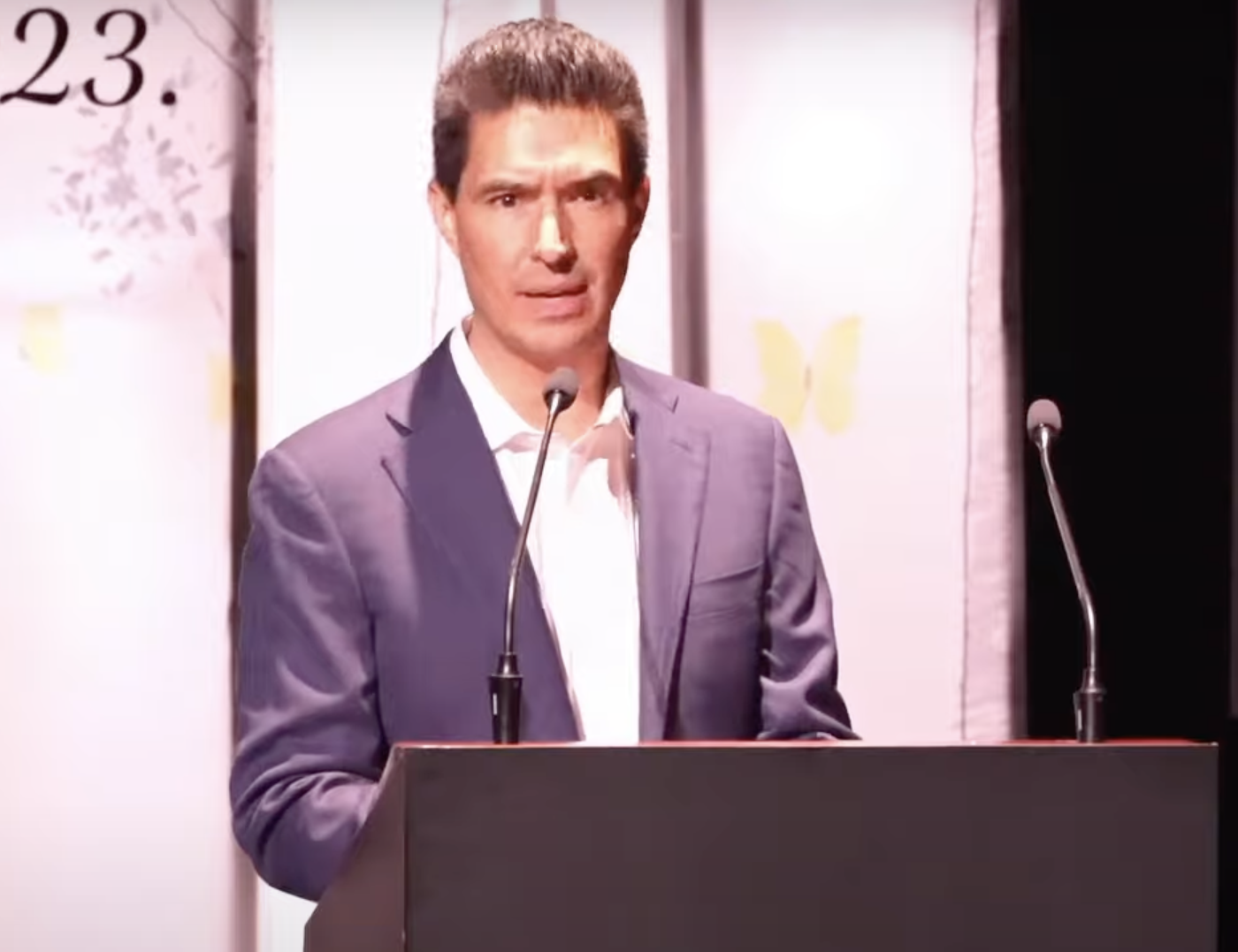A feature story on sexual violence in Colombia, a reconstruction of social repression cases in Peru and coverage of the elites behind cattle ranching in Brazil were the Latin American works recognized with the 2023 Gabo Awards. The ceremony was held on Friday, June 30, at the Teatro Colón in Bogotá, Colombia.
The Gabo Foundation, founded by Colombian journalist and Nobel Literature Prize winner Gabriel García Márquez, has been awarding the Gabo Award for the past 11 years, which recognizes the best of journalism in Spanish and Portuguese in the Americas, Spain and Portugal.
"El grito por justicia y reparación de las mujeres afro violadas sexualmente [The cry for justice and reparation of sexually raped Afro women]", written by journalist Beatriz Valdés, became the first Colombian work to win the Gabo Prize in the Text category in the 11-year history of the award. It is a story that tells how, during the armed conflict in Colombia, Afro-Colombian women were victims of cruel sexual crimes due to racist prejudices.
"We were able to demonstrate how racism, classism and the fringes were there all along so that these crimes went somehow unnoticed, but they were extremely painful, as can be seen in this work," Valdés said in accepting the award. "I hope the dissemination of these stories will make their [the victims’] need for reparations come to fruition."

Journalist Beatriz Valdés is the first Colombian winner of the Gabo Award for Best Text. (Photo: Screenshot from YouTube)
The work is based on Aura’s story, a Black woman who, like her sisters, was a victim of sexual violence by members of legal and illegal armed groups between 2001 and 2007. The author interviewed dozens of women for nearly six years to write her story, which explores the repercussions of such violence on the victims' bodies.
"The cry for justice and reparation of sexually raped Afro women," was published in February 2023 in Colombia +20, the supplement of the newspaper El Espectador dedicated to the coverage of the peace agreements and the armed conflict in Colombia. The feature story also helped victims make proposals for reparations they believe the authorities are in a position to implement to bring justice to those who suffered sexual violence.
"[It’s] An impressive feature story in all regards: well crafted, reported, written [...] This work puts the spotlight on a rather murky topic, which needs to be talked about clearly, to be told, because sexual crimes continue to be a brutal wound in Colombia," wrote the jury of the Text category, made up of journalists Mónica González (Chile), Yásnaya Aguilar (Mexico) and Paulo Roberto Pires (Brazil). “The way in which all aspects of the character unfold is thrilling, which can be known in its entirety thanks to a marvelous effort balancing writing and structure.”
In the Image category, the winning entry was "Ayacucho: Radiografía de homicidios [Ayacucho: A homicide X-ray]," a video reconstruction journalistic project carried out by a team headed by Rosa Laura and César Prado, from the investigative journalism organization IDL-Reporteros.
Based on an analysis of audiovisual material, documents and testimonies, the authors reconstructed six extrajudicial executions at the hands of the military that took place during a violent day of protests against President Dina Boluarte in Ayacucho, Peru, in December 2022.
Through the reconstruction work, they were able to identify the exact places and moments from which the shots were fired that took the lives of the victims, as well as the places where they fell. The team also showed, providing evidence, that military personnel did fire the shots in all six cases.
"Making this feature story has been one of the greatest challenges of our careers. We reconstructed six deaths [...], people whose families, like those of the other 43 killed in the protests against this government in Peru, are still seeking justice," Laura said during her acceptance speech. "We hope this recognition serves to ensure the crimes that took place during the social demonstrations in Peru can continue to be known at the Ibero-American level."
Pardo, for his part, said the project, which was published in February 2023, was possible thanks to the collaboration of journalists, doctors, lawyers, anthropologists, and residents of the city of Ayacucho, his own hometown. The journalist dedicated the award to all of them.

Rosa Laura and César Prado are the authors of "Ayacucho: radiografía de homicidios", winning work in the Image category. (Photo: Screen capture from YouTube)
For members of the jury in the Image category, made up of Eliza Capai (Brazil), Leiqui Uriana (Colombia/Venezuela) and Martín Caparrós (Argentina), "Ayacucho: A homicide X-ray" is journalism "in its purest state," in which the authors used all resources at their disposal to reveal something others want to hide, in this case, the Peruvian State.
"On the one hand, it manages to establish, through an audiovisual narrative, facts that had been hidden and are important to understand this country and somehow put its process on track, whose knowledge has a positive impact on society," the jury stated in its report. "And, on the other hand, it is built with no fireworks, with a narrative austerity that further enhances the value of the story told, going beyond any sensationalist temptation."
The winning entry in the Coverage category was "Nome aos bois" [Name the oxen], by a team of eight journalists from the investigative journalism organization Repórter Brasil, led by Ana Magalhães.
"Name the oxen" is a multimedia special that investigated the Brazilian agribusiness elite. The investigation identified 10 of the most powerful cattle ranching groups in that country and their connections to environmental crimes and the practice of modern forms of slavery. The Repórter Brasil team presents a deep dive on the subject, including biographical data sheets on the cattle barons, interactive maps showing the location of their farms and two long-form journalistic pieces.
After six months of research, the team discovered that nine out of the 10 largest cattle ranchers have been linked to environmental conflicts or have been investigated for corruption. The authors managed to overcome the lack of transparency of the authorities who, alleging commercial secrecy, fail to provide information on who is behind cattle raising in the country.
"Brazilian society knows who are the main exporters of coffee or soybeans, but we do not know who are the biggest cattle producers in Brazil. And that was the main challenge we faced," Magalhães said in the video presentation of the finalists. "But we managed to do it by cross-referencing data from public lands and public records of the large farms to get to those names."
The jury in this category, composed of journalists María Sánchez Díez (Spain), Bruno Patiño (France) and Rosental Alves (Brazil), praised the visual and explanatory elements of the special. They also highlighted how the stories were contextualized, which allows readers unfamiliar with the reality of Brazil to understand the subject.
The Photography and Audio categories of the Gabo Award went to journalists from Spain. Documentary photographer Santi Donaire was the winner with “¿Conseguirá la Ley de Memoria Democrática reparar los daños del franquismo?” [Will the Law of Democratic Memory repair damages caused by Franco's regime?], a photo essay published by the National Geographic magazine in Spain. It documents six years of the current consequences of crimes and human rights violations that took place during the dictatorship of Francisco Franco in Spain.
Meanwhile, the podcast "Costa Nostra," by Spanish production company La Maldita for Amazon Music, won the Audio award. In this non-fiction audio series, journalist Antonio Pampliega narrates in 10 episodes stories of drug traffickers, gangsters and police officers who live and work on the Costa del Sol, in southern Spain.

Jennifer Ávila, co-founder of Contracorriente, from Honduras, was chosen as the winner of the 2023 Gabo Award for Excellence. (Photo: Screenshot from YouTube)
Also honored during the ceremony was Honduran journalist Jennifer Ávila, this year's winner of the Gabo Award for Excellence. This is a recognition given by the Gabo Foundation since 2013 and has been awarded in previous years to figures of Ibero-American journalism such as Javier Darío Restrepo (Colombia), Jorge Ramos (United States), Juan Villoro (Mexico), and the team of El Faro (El Salvador), among others.
Ávila, director and co-founder of the digital news outlet Contracorriente, was chosen to receive the award "for her commitment to truth, justice and the fight against structural violence that affects women and democracy in one of the Latin American countries where it is most difficult to practice journalism," according to the Gabo Foundation's Board of Trustees.
In her message of thanks, the journalist remembered her colleagues in Central America, Cuba, Mexico and Venezuela who are facing jail, exile, impunity or violence. She also said how, for her, journalism has been [a kind of] therapy that allows her to tell stories about the crises and attacks against democracy her country has experienced and which have affected her family.
"What’s the point of what we do? To preserve memory. The impunity of power seeks to do away with memory, the memory of a file, of a people, of struggles, of dignity. We journalists have become the guardians of memory, protectors of the word," she said.
The Gabo Award ceremony also served as a stage to pay tribute to French journalist Jean-François Fogel, who served as president of the Gabo Foundation's Board of Trustees and who passed away on March 19 of this year. Fogel, who was a personal friend of Gabriel García Márquez, was remembered by his colleagues as a pioneer of the digital transformation of journalism.
The Gabo Foundation dedicated a space in its awards gala to remember Guatemalan journalist José Rubén Zamora, who has been imprisoned for nearly a year, in the midst of a judicial process that has been labeled as irregular.

José Zamora thanked journalists for the support they have given to his father, José Rubén Zamora, founder of elPeriódico from Guatemala, who remains imprisoned. (Photo: Screenshot from YouTube)
His son, journalist José Zamora, also a journalist, gave a speech in which he denounced that the charges of the Guatemalan State against his father are a sign that journalism in his country is a crime.
"Today our region and the world is experiencing an accelerated regression against democracy and freedom. Journalists and critical voices denouncing corruption, organized crime, human rights violations and abuses of power are being persecuted," he told the audience at the Teatro Colón. "Being here tonight while my dad is in his cell is truly magical realism."
Zamora thanked the team of elPeriódico, the news outlet founded by his father, which announced its closure last May as a result of the judicial process. He also expressed his admiration for Guatemalan journalists who continue to do their work despite a hostile environment and thanked colleagues in the region who have shown empathy with the situation his family and journalism are facing in Guatemala.
"Thank you for all the support and for continuing to tell those stories that corruption, repression and power want to hide. The best defense against attacks on journalism is more journalism," he said. "They will not silence us. We will continue stripping and saying no to power."
Banner photo: Courtesy Gabo Foundation